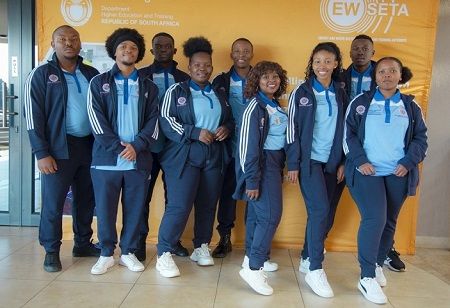The collaboration spearheaded by the Energy and Water Sector Education and Training Authority (EWSETA) and the Chinese Culture and International Education Exchange Centre (CCIEEC) is anticipated to strengthen the contribution of technical vocational education and training (TVET) colleges in South Africa's transition to a more equitable energy system. “This programme not only seeks to establish a comprehensive renewable energy education and industry system in the country’s TVET colleges but also to enhance the international standards of South African TVET colleges over the next five to ten years”, explains EWSETA CEO Mpho Mookapele.
The collaborative initiative bids farewell to 54 students and six instructors from various TVET colleges as they embark on a year-long experiential learning journey in China. These learners, hailing from institutions such as Elangeni TVET College in KwaZulu-Natal, Vhembe TVET College in Limpopo, Ingwe College in the Eastern Cape, South West Gauteng, Westcol TVET College in Gauteng, and Northern Cape Rural TVET in the Northern Cape, will undergo training in solar PV manufacturing.
In April, the Seta Integrated High Impact Programme (SIHIP) was launched. It outlines a series of initiatives to be undertaken by Setas to drive collaboration and cooperation among Setas and maximize the impact and effectiveness of Seta programs toward national development goals. The Just Energy Transition Learner and Lecturer Development Support Programme align to the aims of the SIHIP, with EWSETA partnering with the Construction Education and Training Authority (CETA) and the Food and Beverage Manufacturing Seta (FoodBev Seta) on this programme, enabling the programme to be scaled up from an initial four TVET colleges to the participation of six TVET colleges.
By offering top-notch trainers, curriculum enhancement, exchange initiatives, research opportunities, and engagement with Chinese enterprises, alongside financial support, the collaboration aims to directly enhance the learning experience for both students and educators. Furthermore, it is poised to address South Africa's pressing power supply challenges and align with the nation's goals of economic recovery and skill advancement. Looking ahead, the establishment of renewable energy production facilities within TVET colleges, focusing on local manufacturing of solar panels, inverters, and lithium batteries, is projected to introduce new revenue streams for these institutions. This initiative also aims to bolster South Africa's global competitiveness in a market largely dominated by China.
The establishment of these production lines is set to expand the capacity of South Africa's TVET colleges. Moreover, by offering learners valuable practical experience in real workplace settings, the competency of renewable energy skills cultivated in these institutions is anticipated to improve. Leveraging Chinese expertise and educational technology, the program aims to enhance the quality of TVET education in South Africa through international cooperation. It seeks to align educational offerings with industry demands, providing students with hands-on skills and practical experience. In terms of skills development, the initiative will address critical shortages in renewable energy and other sectors, while also preparing both students and educators for emerging technologies and industries.

